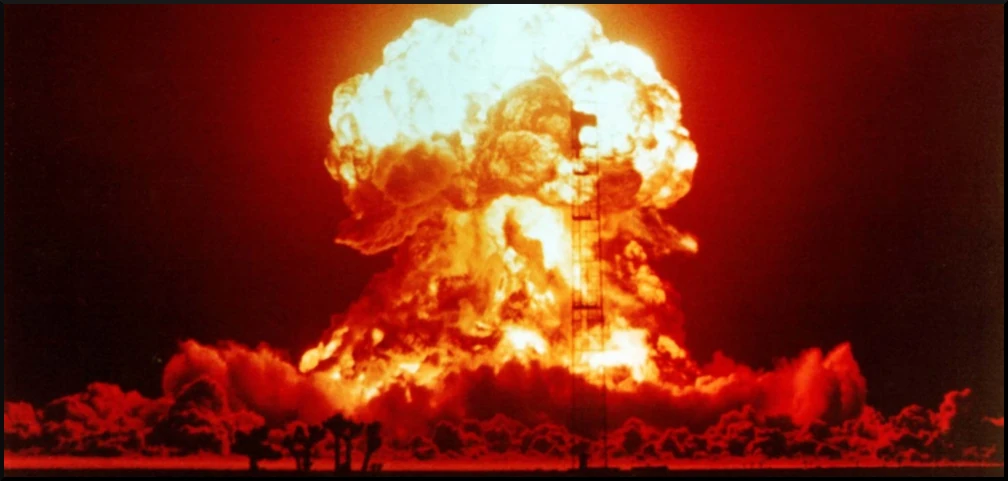by John Wojcik, Mark Gruenberg and Ben Chacko, published on People’s World, May 16, 2024,
The U.S. has dismissed Chinese calls for a no-first-use treaty between nuclear weapons states, saying it has questions about China’s “sincerity.”
The outright dismissal of China’s proposal followed a major speech in which Biden announced radical tariffs of up to 100 percent, on steel imports from China. That speech follows months of U.S. military buildup in the waters off the coast of China, including the placement of additional nuclear submarines around the Korean peninsula, all in the name of “protecting” Taiwan, which is, of course, a part of China itself.
Undersecretary of State Bonnie Jenkins, the country’s top arms control official, told the Senate Foreign Relations Committee last night that the U.S. worried China had increased its number of nuclear warheads to over 500, might have 1,000 by 2030, and that this was proof that the country was not “sincere” about its proposal to ban first use of the apocalypse-engendering weapons.
The Biden administration’s claim that China had increased the number of its warheads to 500 is just that – an unverified claim. In addition, the U.S. has 12 times that number with an admitted 3,700 of such warheads.
The U.S. says China refuses to engage in nuclear disarmament talks with it. China actually has engaged in talks, first by discussing with the U.S. the need for the U.S. to reduce its outrageously large number of missiles, as compared to China’s number, to show it is serious about fairness. And now it has added to those talks with its proposal to ban the first use of the weapons.
China’s position is that it has an arsenal that is tiny in comparison with that of the United States and that the size of the arsenals has to be part of serious talks. China has also gotten India to sign a no-first-use deal between those two countries. While all these initiatives by China were underway the U.S. was busy unilaterally canceling nuclear arms deals between the U.S. and Russia and continuing to push expansion of NATO not just up to the borders of Russia but into the Pacific regions near China.
China also stores its warheads and delivery systems separately, to avoid the risk of launches by accident or misunderstanding, as almost happened in 1983, when Soviet lieutenant Stanislav Petrov recognized reports of incoming U.S. missiles as a system malfunction and prevented a retaliatory strike which could have begun World War III.
The new, highest-ever U.S. tariffs on Chinese products were announced by President Biden shortly before the Chinese peace initiatives were rejected by his administration. The tariffs would apply to government-subsidized Chinese steel, aluminum, solar cells, electric vehicles—rising to 100% tariffs this year—and their batteries, semiconductors, and some raw materials.
The Biden tariffs are much higher than the Trump tariffs that Biden opposed when Trump was president.
Biden is competing for the White House against the dangerous, right-wing Republican nominee, Donald Trump. The administration hopes that one result of imposing such high tariffs is that they will take the issue of Trump’s political gains from his hatred of China away from him.
As Biden’s predecessor, Trump imposed 10% tariffs on all foreign steel and aluminum. They boomeranged and Trump had to backtrack when both the Steelworkers and Auto Workers pointed out how much of the steel and aluminum in cars, trucks, and SUVs comes from Canada.
Biden criticized China for dumping products below “cost” around the world and for Chinese government subsidies. The role of big corporations in creating the high costs, of course, is not a concern in U.S. big business circles. They oppose, of course, any low costs that might result from the efforts of a socialist government to provide subsidies to industries important to the working-class majorities in such countries. Chinese steelworkers are among the many millions of workers in that country who have been lifted out of poverty.
There are numerous administration policies, including the Inflation Reduction Act, massive infrastructure programs, and pro-environment measures that have boosted the economy and improved living standards for workers. Over the long haul, jingoistic attacks on countries like China and Russia and refusal to reduce the threat of nuclear war will work against the interests of U.S. workers and everyone else on the planet.
*Featured Image: A U.S. nuclear weapons test in Nevada in 1953. | International Campaign to Abolish Nuclear Weapons / Creative Commons
